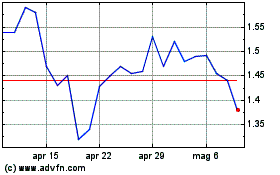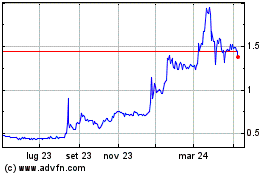Citigroup's Last Proprietary Trader Walks Out the Door
18 Agosto 2016 - 4:10PM
Dow Jones News
Citigroup Inc.'s last real proprietary trader is leaving the
building.
Anna Raytcheva, a Citigroup trader who most recently ran a
proprietary trading desk at the New York bank, is leaving to open
her own hedge fund next year.
Ms. Raytcheva said in an interview this week that she expects to
leave the bank later this month. The move follows Citigroup's
decision earlier this year to close the proprietary trading desk
that Ms. Raytcheva ran.
The lender, run by Chief Executive Officer Michael Corbat, has a
long history with proprietary trading and has held on to the
strategy years longer than other big banks.
Proprietary traders at banks are high-paid employees that buy
and sell for the firm's own account, rather than to match investing
clients with securities.
The firm's trading roots go back to Salomon Brothers, whose
1980s trading exploits were featured in the book "Liar's Poker."
That firm was ultimately folded into Citigroup, whose billions of
dollars in trading losses during the financial crisis prompted
repeated taxpayer-led bailouts.
Banks used to routinely engage in proprietary trading. Citigroup
and other large banks including Goldman Sachs Group Inc. and Morgan
Stanley had multiple desks dedicated to the lucrative but risky
practice before the financial crisis.
But the "Volcker rule", part of the post-financial-crisis
regulatory overhaul, banned most types of proprietary trading and
shifted banks' trading activities to those on behalf of clients. To
comply with the rule, Citigroup sold or spun off businesses,
including an emerging-markets hedge fund and a private-equity unit.
It also closed down Citi Principal Strategies, its dedicated
proprietary trading desk, in January 2012.
Such retrenchment has been common at big banks over the last
five years, with proprietary traders decamping to hedge funds and
other less-regulated industries.
The Volcker rule makes exceptions for some assets, including
municipal bonds and other government securities. The five-person
unit that Ms. Raytcheva most recently ran, called the
strategic-trading desk, traded the bank's own money in U.S.
Treasurys and other securities issued by government agencies,
including mortgage firms Fannie Mae and Freddie Mac.
Citigroup still has some traders that can engage in
Volcker-compliant proprietary trades. But Ms. Raytcheva's desk was
the last stand-alone effort of any significant size at the bank,
people familiar with the matter said.
Citigroup closed the desk in May, saying that trading
opportunities had dried up and that the capital could be better
deployed in client-facing businesses. Also, Ms. Raytcheva said she
found it limiting to run a proprietary trading desk that could deal
only in a narrow set of financial instruments.
"The industry is going through a structural change," she said.
"I think there is an opportunity for smaller, more nimble players."
She also said she wanted to expand beyond focusing primarily on
U.S. macro trends.
Ms. Raytcheva, 44 years old, said her hedge fund, which doesn't
yet have a name, would focus on global bets in markets including
foreign exchange. Most of the other employees from Ms. Raytcheva's
former desk have stayed at the bank, trading on behalf of clients,
a bank spokeswoman said.
The Volcker rule isn't the only force that has reshaped
Citigroup since the crisis. As the rule was phased in over the past
few years along with tougher capital requirements, the bank has
focused on becoming smaller and less risky overall. Its
institutional bank has pared down the number of clients it serves
and sold various units, including a high-frequency trading
division.
In many ways, though, Citigroup has grown more tied to Wall
Street: It has shed retail branches and shut consumer operations in
many countries across the globe. Bank executives have also said
they would like to continue expanding the fixed-income trading
division, one of the most important units at Citigroup, even as
rivals retrench.
Ms. Raytcheva, who grew up in communist Bulgaria, joined Citi as
an interest-rate-options trader in 1994, four years before it
merged with Salomon Brothers parent Travelers Group. She rose
through the ranks of Citigroup's fixed-income unit and during the
2008 financial crisis held a senior role that involved managing
risk for the bank's corporate treasury department.
That job included overseeing mortgage securities that suffered
billions of dollars in losses along with the industry. "It was a
very challenging period, and there was a lot of hard work and
effort to navigate through that," Ms. Raytcheva said. "I have
learned from the crisis and it's made me that much better."
(END) Dow Jones Newswires
August 18, 2016 09:55 ET (13:55 GMT)
Copyright (c) 2016 Dow Jones & Company, Inc.
Grafico Azioni Fannie Mae (QB) (USOTC:FNMA)
Storico
Da Mar 2024 a Apr 2024

Grafico Azioni Fannie Mae (QB) (USOTC:FNMA)
Storico
Da Apr 2023 a Apr 2024
